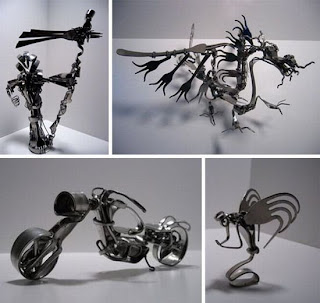It happened while I was making my usual Wednesday night drive home from the dojo. I'd just spent two hours on the mat practicing Aikido, a martial art founded on principles of ki (energy) rather than combat. Essentially, Aikido teaches its practitioners not to hit back when hit, but to a.) avoid the hit, b.) absorb its energy, and c.) give it back to the attacker in a harmonious way. "In a harmonious way" tends to mean incapacitating the attacker. Pinning them down...which is comparatively harmonious.
So, I'm heading home, all amped up with leftover ki, feeling harmonious with everything -- admittedly, I'm in an absorbent and impressionable state of mind. I'm listening to American Routes on the local public radio station.
Producer and host Nick Spitzer is interviewing Pat Martino, Philadelphia jazz modernist. Martino left home when he was a teen and pursued jazz in Harlem. He played ensemble for a while, then went solo and got big. But in 1979, he underwent an emergency operation to correct an aneurysm. The surgery damaged a part of his brain and left him with amnesia. Family, friends, and how to play music: all forgotten.
 |
| (Pat's story comprises a portion of the second hour on the show called "Guitar Heroes: Pat Martino & Ben Hall." Jump to about a half-hour in, unless you want to groove to the whole show.) |
But not playing began to feel "volatile" so he picked it back up. He learned how to play again, bit by bit, and returned to all-new realms of jazz greatness.
To achieve any level of greatness, Pat talks about having to simultaneously reduce and elevate the guitar. He likens it to any necessary, functional item around his house, specifically spoons and forks. They are tools he takes out when he needs them. They are tool that serve their purpose.
Oh, baby, that admission walloped me hard.
I thought immediately about the writer's tools: pen/paper or e-pens/paper (laptops). Some writers, both famous and unpublished, often fuss over having just the right kind of pen (roller ball vs gel ink, smooth flowing vs scrape-heavy) or the right kind of journal (hardback spiral-bound vs soft, sturdy leather-bound), or the right kind of laptop (tiny, lightweight vs a good, ol' fashioned typewriter). I used to fuss over these exact things. And while I fussed, I did not have to worry about writing. How could I possibly write when all I had was a Bic click pencil and a floppy five-subject notebook to scrawl in?
But when I finally got the exact pen I wanted and the precise kind of journal, I emptied the one and filled the other with words. Not stories. Meaningless, rambling, disconnected words. By themselves, words do not tell stories. They are just words.
But I had all the right tools to tell stories, didn't I? Shouldn't the stories just be pouring from my ballpoint?
Well, no. Stories don't come from the pen, the paper, or the keyboard. They come from the storyteller.
The same is true for jazz guitarists. Notes may come out of an instrument, but music flows only from a musician.
Pluckers may pull strings and writers may scribble, but it's musicians and storytellers who do the real work. And to transition from one level to the next, the artist must learn how to properly use her tools.
I was not using my pens/papers like tools. Instead, I treated them like divine totems. Years ago, when I finished my undergraduate degree and had to push writing out of my prime time and into my spare time, I learned how to reduce the pen/paper to tools. Because I worked full-time and managed a household, time was tight. When I sat down to write (around 11 p.m.) I felt the necessity to get the story out because 2 a.m. was gonna creep up like an assassin and kill my writing time. When I commuted on the bus to and from work, I wrote with anything I had on hand. I wrote on anything that had blank sheets of paper. And I wrote despite the bumps and sudden swerves that mangled my handwriting.
Oh, how I would bemoan the corrosion and corruption of my writing. It used to be magical. It used to come out in gorgeous swirling script from a fancy pen on smooth stone-ground paper. Now it was relegated to pragmatic, get-it-done taskery.
And that was how I continued to work, even when I left my job and took up graduate school. Every month, I had to produce twenty pages of creative work. Twenty pages of story. So I sat down (anywhere, anytime possible) and I wrote (with anything available).
And it wasn't until I heard Pat Martino talk about his guitars like spoons that I realized what a huge favor I had done myself. My pen/paper, and all the other craft elements that go with writing (using metaphors, crafting settings, exploring objective correlatives, mapping character arcs, engineering storyboards, etc) had all become tools. No more mysterious or elusive than spoons and forks.
 |
| Spoon slave by Forked Up Art. |
They were there to serve me.
Imagine if every time you sat down for breakfast, you had to summon the spoon-muses just to eat your bran flakes! Imagine what you'd look like if you only ate when the mood struck just right.
Writing IS eating to me. It is sustenance. I can't wait till the mood is ambient and gods are friendly. Screw moods and gods -- I'M HUNGRY!
Yes, I have relegated my pens and paper to mere tools, but I have not demoted my storytelling. Because I had mastered my tools, I could use them to construct many amazing things!
 |
| Art by Matthew Bartik. |
